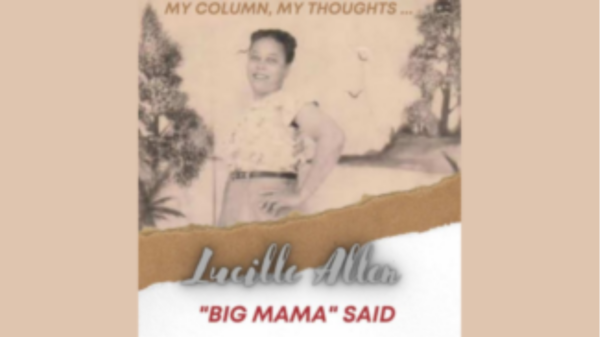By Terry Allen
If Lucille “Big Mama’s Allen had lived her prime during this new digital season, then her rules of thumb taken out of her playbook would be trending every week.
It would be a bestseller.
Today, she would say, “My Baby Boy, (that is what she called me), be very aware of someone who appears helpful and belonging but they are really very dangerous and powerful with no skin in the game. You have to call a spade a spade, baba”
Lucille “Big Mama” Allen wanted us to know that no matter, that the Okey Doke is real. FYI, the term, “okey-doke,” means some sort of trick, game, scam, attempt to fool, shortchange, deceive or mislead; which was re-popularized by President Obama. He had a Big Mama too!
She said to reduce the hidden agenda and call a spade and make sure you are dealing with individuals that have “skin in the game,” meaning dealing with those who have cultural history and a vested interest and expertise.
Big Mama said that would reduce you from being swindled; hood-winked; backstabbed by hidden agendas or novices unaware of the impact of our culture and activity history.
Now you know that the mainstream’s dictionary defines calling a spade a spade as to speak plainly without hidden and false pillars. But what happens when a perfectly direct phrase takes on a more indirect and disguised meaning over time?
To be clear in this reference, a spade was not an item in a deck of cards but a gardening tool.
That being stated, the early usages of the word “spade” did not refer to either race or skin color.
Yet in our intrinsic cultural experience, Politicians and commentators have also frequently used the expression. After returning to the United States after World War I, the scholar and civil rights activist W.E.B. Du Bois wrote in his famous 1919 editorial “Returning Soldiers” about the struggles of African American men:
“We stand again to look America squarely in the face and call a spade a spade. We sing: This country of ours, despite all its better souls have done and dreamed, is yet a shameful land.”
In the late 1920s during the Harlem Renaissance, “spade” began to evolve into code for a Black person, according to Patricia T. O’Connor and Stewart Kellerman’s book, Origins of the Specious: Myths and Misconceptions of the English Language.
The Oxford English Dictionary says the first appearance of the word spade as a reference to blackness was in Claude McKay’s 1928 novel Home to Harlem.
In this new post-George Floyd moment we have created the new DEI teams in corporate America and they are denying the community a seat at the table again.
I have had many conversations with multiple veteran and crucial community leaders and organizations that are being denied a seat at the table because with the new DEI leadership who mostly do not have, as PR pro Pam Purifoy would say, “no skin in the game,” are denying traditional and impactful initiatives.
They are refusing any continued engagement in pivotal partnerships and engagements that are masterfully branding unions between culture and commerce. Many culture-centric events and programs are being taken out of marketing consideration and placed in a DEI inbox to be denied.
So, what does all of this mean for people who want to, well, “call a spade a spade?”
I urge caution. Be aware of the false barriers and outcomes in the DEI movement. BIG Mama is shaking her head!!
Terry Allen is an award-winning media professional, journalist, and entrepreneur. He is also the founder of City Men Cook and 1016 Media. Reach him at terryalllenpr@gmail.com

You must be logged in to post a comment Login